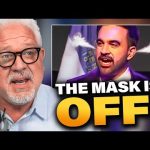The Department of Justice has quietly undercut James Comey’s victim narrative by producing a stack of personal emails and handwritten notes that plainly contradict his sworn testimony, and the revelations are damning. Those records show Comey not as a passive bystander but as an active participant in shaping media narratives during the 2016 campaign, a fact that should trouble anyone who ever bought his self-styled guardian-of-integrity act.
Prosecutors say the emails reveal Comey tracked and encouraged his confidant Daniel Richman to feed reporters background and anonymous tips — behavior Comey repeatedly denied under oath. The exchanges show Comey even praised coverage and urged his associate to “make him smarter,” exposing a brazen effort to manipulate press accounts while overseeing investigations into political rivals.
Even more explosive are handwritten notes discovered in a locked safe and scattered files that appear to show Comey was briefed in September 2016 about intelligence the media later dubbed the “Clinton Plan” — intelligence Comey told senators he didn’t remember. That contradiction is not a mere memory lapse; it’s documentary evidence that undercuts Comey’s credibility and bolsters the government’s case that he misled Congress.
Facing these documents, the DOJ flatly rejected Comey’s bid to have the indictment tossed as politically motivated, arguing the prosecution meets the legal standard and that the defense has not produced direct evidence of selective or vindictive intent. In short, the government is saying the case rests on Comey’s own words and contemporaneous records — exactly the kind of accountability the American people expect.
The fallout doesn’t stop at emails. FBI review teams have also uncovered classified materials and records stored in so-called burn bags and a SCIF adjacent to the director’s office, raising alarming questions about record handling and the cozy culture at the top of the bureau. If true, the discovery of sensitive files and notes in unsecured places proves what conservatives have long warned: the watchdog bureaucracy was often a partisan machine rather than a neutral guardian of the rule of law.
Americans should be furious, not surprised, to learn that the man who lectured the country about ethics was apparently busy coordinating anonymous leaks and keeping secret notes that contradict his testimony. This isn’t about political revenge; it’s about equal application of the law — a principle too often ignored when it inconveniences the permanent political class.
Let the courts do their work and let the evidence speak. Patriots who believe in accountability should welcome a full airing of these documents in open court so voters can decide whether the self-appointed elite who weaponized the institutions against ordinary Americans will finally face consequences. The rule of law means nothing if it applies only to the little people and spares the men who abused their power.




